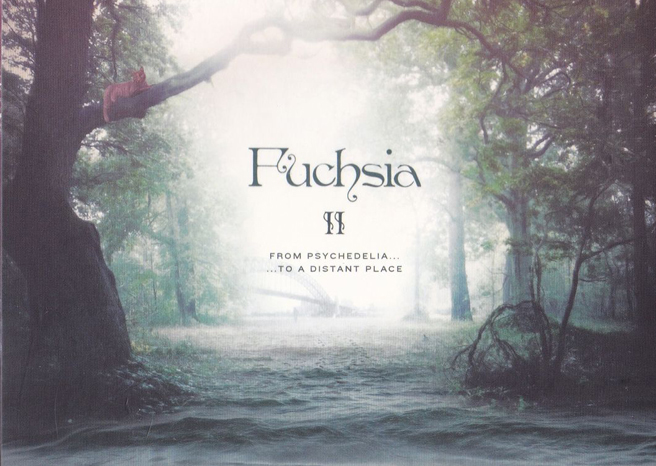This album is all about a journey.
A journey that started out in the ‘Psychedelia’ of the late 1960’s London underground scene. To a ‘distant place’ – Australia in 2013. It is also about the journey of an album that disappeared in 1971 – but became a cult classic 40 years later.
The British progressive folk-rock band ‘Fuchsia’ – founded in 1970 – had only one release (a self titled album) back in 1971. Almost immediately after releasing the record, the group disbanded. A promised tour went sour, sales of the disc were sad. The band went under.
The architect of the band: Tony Durant (acoustic guitar, electric guitar, lead vocals) formed the band with fellow Exeter university students Michael Day (bass guitar) and Michael Gregory (drums, percussion.) This founding trio was augmented by a three-woman string section (notably, with Vanessa Hall-Smith on violin.)
After the demise of the band, Durant went to work in Australia with the Sydney-based musician / writer Dave Warner. Warner was – at that time – creating a punk rock album. At first, Durant intended to commute from London to Australia to work on the project. But then he decided to settle in Australia – and to work on some other lucrative undertakings that came his way. It was in Australia that Durant came to realize the value of the original Fuchsia album – and he learned of his popularity among collectors and enthusiasts.
Durant finally created a new band (called Fuchsia II) and this composed of Lloyd Gyi (drums, percussion), Emily Duffill (cello), Tracy Wan (violin), Lidia Bara (violin) and Jo Bara (cello), with Suzy Toomey (accordion) and Isabel Durant (backing vocals). The band published a new album ‘From Psychedelia to a Distant Place’ this year.
Opening track ‘Melancholy Rd’ knowingly collects us up from where the last album left off in 1971. The lyrics have a quaint naive sweetness to them. A nostalgic charm. For example, in Sydney, there is probably no need to urge people to: “Come inside from the cold…”
Perhaps the founder of that original project in 1971 made a ‘Wrong turn on Melancholy Road?” But although that is suggested in the words on this track, it is hard to believe. It wasn’t so much a wrong-turn – it was more a conscious decision motivated by other factors. Violins weave around the central body of this rakish piece – like a rag-tag woollen shawl draped over bony shoulders. The effect is rather comforting.
‘Girl From Kandahar’ is so hippy-hippy that you can almost smell the Patchouli oil and hear the faint rustling of cheese-cloth. The voice is clear and correctly enunciated. You might imagine that it is performed by a tall English man wearing a white panama hat. The chords are crisp – almost funky – and the familiar “No, no compromise” chorus has a smattering of strings that sound faux-classical in style. It is an agreeable song, but it might not shift you from your seat.
Continuing the theme of missing years / many regrets, the next track ‘Lost Generations’ seems to be a study of hippie-folk who have lost their way. Once upon a time, these folk would have been reading significant messages in the skies, and speaking words of astral significance. But now all those old hippies – and their wisdom – has gone. Scattered and disconnected. The crying guitar solo sobs and squalls at the unfairness of this. The plucked strings add some tension. The entire piece fits you like your favourite threadbare trench coat.
‘Fuchsia Song’ sounds like early Jethro Tull (without flute) – but with the same cockney 1960’s style chirpiness that you might find in work by the Small Faces. Artificial cheeriness infects the whole piece. But behind the fake smile – you might detect a groan of despair. It is like putting on a ‘brave face’ at a funeral. The band was originally named after the fictional character ‘Fuchsia Groan’ (from Mervyn Peake’s Gormenghast books.) In the story, the Fuchsia character was largely ignored by her parents – and so she had to make her own way in the world. At times she found solace by entering into an imaginary place. This may go some way to explain why Tony Durant constantly feels abandoned. Maybe he feels that he was cast out right from the very beginning. And – by using his imagination – he can still find his way back home.
 ‘The Waves’ track has a scrupulously crafted acoustic guitar accompaniment and some lush strings that halo the central theme. The rocky beat starts half way through the song – and then a glistening lead guitar creates some burnished shapes – as the bass and rhythm picks up.
‘The Waves’ track has a scrupulously crafted acoustic guitar accompaniment and some lush strings that halo the central theme. The rocky beat starts half way through the song – and then a glistening lead guitar creates some burnished shapes – as the bass and rhythm picks up.
Final track ‘Piper At The Gates’ with its obvious allusion to the first Pink Floyd album – is yet another song about regret over the death of time. If you can get through the various clever-clever Floyd-song references in the lyrics, you will hear a Middle-Eastern sounding pipe that wraps itself softly around the pulse. Then a fluster of drums that invites a lucid guitar to come to the fore. Yes, you may have heard it all before. But it is elegantly done, and it warms your spirit.
That first extravagant Floyd album of 1967- with Syd Barrett at the helm – was well received upon its initial release and has been successfully re released several times since. So did “The music stop” for Pink Floyd? Uh, no. It was never a game of ‘Musical Chairs’ for them. They must have done something right. And Fuchsia must have done something wrong. If Durant is still sore (after all these years) that Pink Floyd did it – while Fuchsia did not – it seems a bit shabby of him.
Nostalgic, remorseful and slightly cliché ridden. This album does not offer us anything new. But it is cozy and pleasant enough. It has a comfortable ‘lived in’ quality to it. Diehard prog-rock enthusiasts and bric-a-brac collectors might well warm to it.
The reason why the first Fuchsia disc became collectable was because it was a curio. It was a hard-to-come-by artifact lost in time and space. It was not valued because of it’s artistic significance or it’s amazing musical merit. It was highly valued because it was rare. Tony Durant needs to come to terms with this reality. And move on.























prada handbags…
http://www.theparentsite.com/#louis-vuitton-handbags louis vuitton outlet online…
シャネル 財布…
グッチ アウトレット…